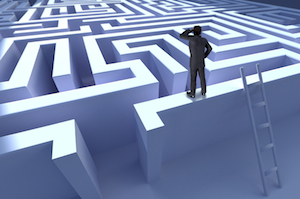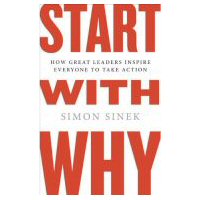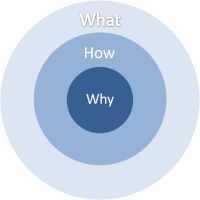Jul 31
2010
0
comments
Find your own “Why”
 When you compete against everyone else, no one wants to help you. But when you compete against yourself, everyone wants to help you.
When you compete against everyone else, no one wants to help you. But when you compete against yourself, everyone wants to help you.–Simon Sinek
“Do you compare yourself with other people to see who is inferior and superior?” This was a question asked to me the other day when I attended a seminar called “Management of emotion” held by one of my friends. We were discussing about “contempt and insult”, which is one of the four factors that hamper smooth communication. “I think I do.” I answered and felt a little embarrassed.
Having been born during the second baby-boom in Japan, everything was about competition. I’d always feared that once I stopped competing, I’m out. In fact, even at the age of 37, I still have a habit of saying “Oh-huh, what’s next?” every time I finish something rather than saying “Phew, I deserve a break.”
I always felt that there was a filter built into the society, which is constantly seeking who is “capable” and “incapable.” I think this unconsciously developed the above habit of by comparing myself with others. And when this happens, people will easily sense it, which hampers smooth communication.
 So how can I avoid this? I recently read a book called “Starting with Why,” which gave me a couple of insights. According to Mr. Sinek, the author, “many companies (individuals) do their business (competition) with wrong mind, which is to think about things in order of What→How→Why.” Take Dell as an example. They send out a message that says “We produce personal computers (What). They are simple and cheaper than other companies’ and you can customize them to any extent (How, differentiator). Will you buy our products? (A reason to buy from Dell. Why).
So how can I avoid this? I recently read a book called “Starting with Why,” which gave me a couple of insights. According to Mr. Sinek, the author, “many companies (individuals) do their business (competition) with wrong mind, which is to think about things in order of What→How→Why.” Take Dell as an example. They send out a message that says “We produce personal computers (What). They are simple and cheaper than other companies’ and you can customize them to any extent (How, differentiator). Will you buy our products? (A reason to buy from Dell. Why).In contrast, Apple thinks
Everything we do, we believe in challenging the status quo. We believe in thinking differently (the why). The way we challenge the status quo is by making our products beautifully designed, simple to use and user-friendly (the how). And we happen to make great computers (the what). Wanna buy one?
Everything we do, we believe in challenging the status quo. We believe in thinking differently (the why). The way we challenge the status quo is by making our products beautifully designed, simple to use and user-friendly (the how). And we happen to make great computers (the what). Wanna buy one?
They think in a quite opposite way (Why→How→What) to Dell.
 Mr. Sinek repeats “people don’t buy WHAT you do, they buy WHY you do it.” He tirelessly explains this from examples of individuals (e.g. the Wright brothers and Martin Luther King, Jr.) and companies (Southwest Airlines, Harley-Davidson, etc.).
Mr. Sinek repeats “people don’t buy WHAT you do, they buy WHY you do it.” He tirelessly explains this from examples of individuals (e.g. the Wright brothers and Martin Luther King, Jr.) and companies (Southwest Airlines, Harley-Davidson, etc.).Recently I read a book “Delivering Happiness” written by Tony Hsieh, CEO of Zappos (a very successful online shoe store in the US), and exactly the same thing was written in the book, which says “We are not selling shoes. We are delivering happiness (through shoes).”
After all, you compare yourself with others over “What” (educational background, companies, qualifications, looks, etc.) if you do not have your own “Why.” And when you do so, you start thinking whether your rank is higher or lower.
At the end of the book there was an inspiring story. It is a story about a boy named Ben, who goes to Hanna High School.
Ben is a member of a track club. Because he was born with mild cerebral palsy, he often falls to the ground by losing his balance while running. He has to do the routine jogging every day as a member of the track club just like the other members have to. The other members finish jogging in 25 minutes, but it takes 45 minutes for him as he falls to the ground over and over. What is interesting is that the same thing happens after 25 minutes every day. All the members who have finished jogging go back to him and start jogging with him to the goal. He is not competing with others. He knows his “Why” well. He fights with himself every day. That is why everybody supports and helps him.
Yes! The problem was that I have not found my own “why.” This story inspires me. I need to start thinking of my own “why” and stop comparing myself with others.

